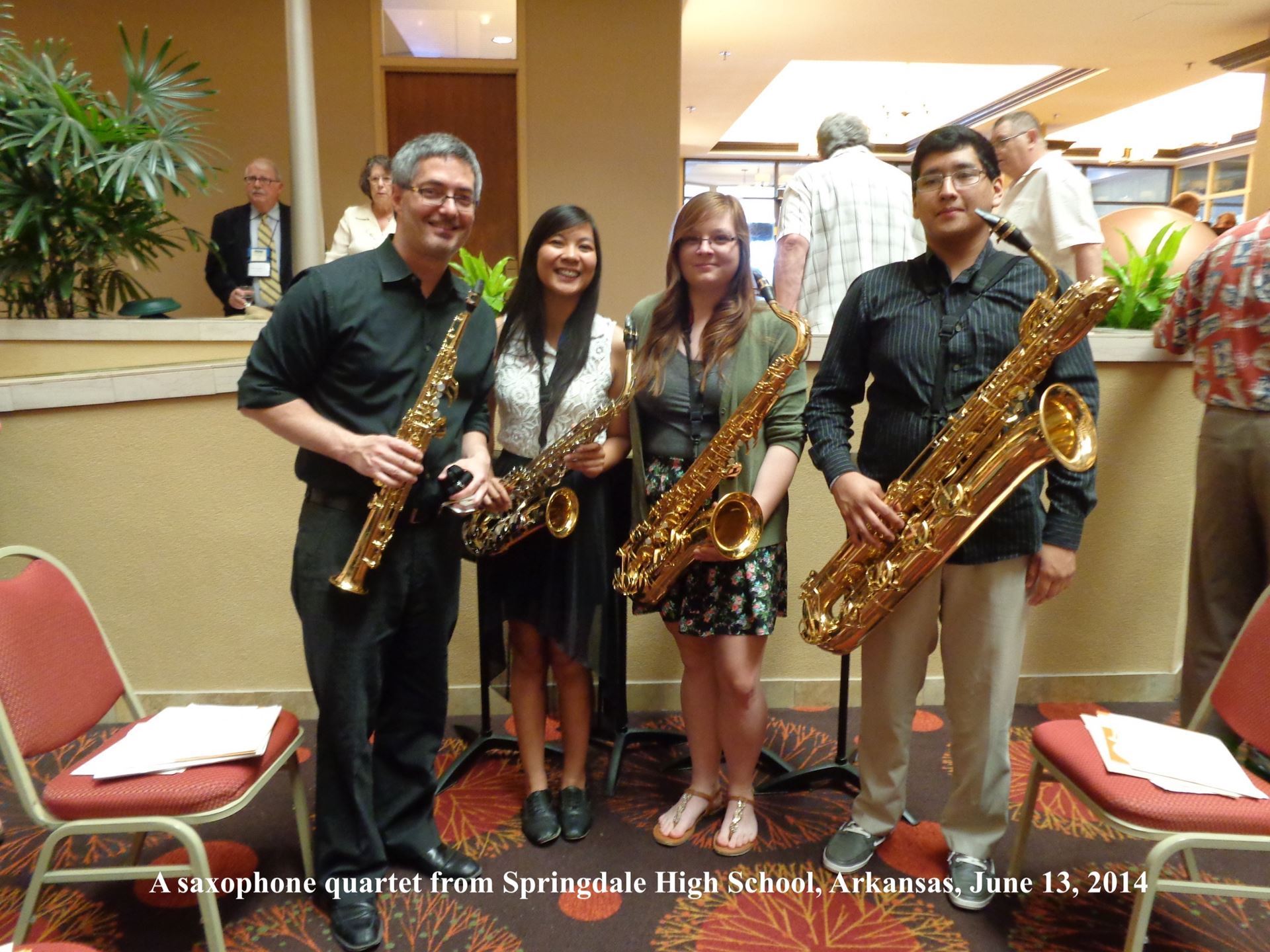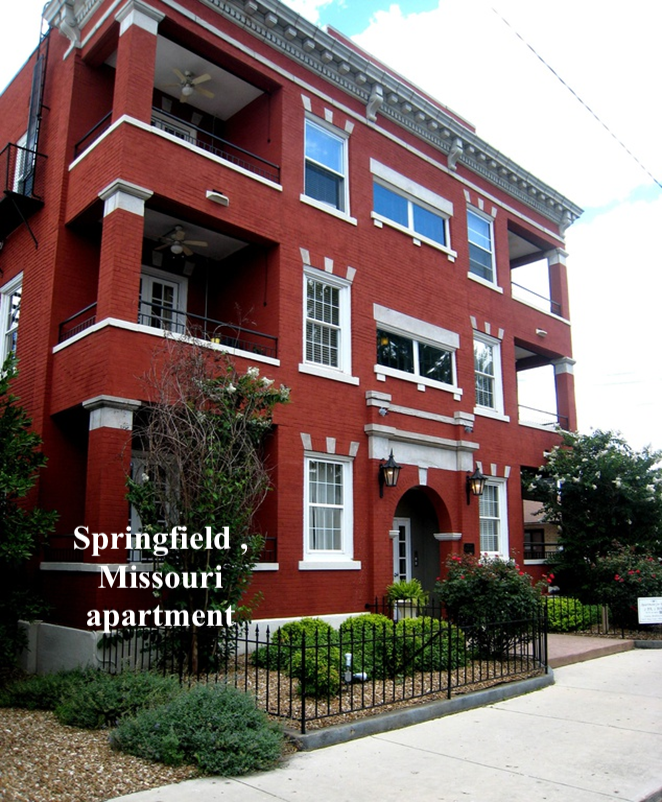by Cora Angier Sowa
 Springdale Arkansas, in the heart of the Ozarks
Springdale Arkansas, in the heart of the Ozarks
In June, 2014, I had the good fortune to visit Springdale Arkansas, located in a lovely area of Northwestern Arkansas, deep in the Ozark Mountains. Springdale is best known as the headquarters of Tyson Foods; the headquarters of Walmart and of the J.B. Hunt trucking company are nearby. A few miles to the south is Fayetteville, home of the University of Arkansas. To the north, in southern Missouri, is Branson, known for its theme parks and tourist locations.
I was in Springdale June 10-15 for the convention of the National Railway Historical Society. We were guests of the Arkansas and Missouri Railroad, which is also headquartered in Springdale. The A&M is a short-line road, only 140 miles long, that is an important connector between the BNSF Railroad to the north, and the Union Pacific and Kansas City Southern Railroads to the south, on the Arkansas River. We spent most of our time going on rail excsursions, and took plenty of photographs, in a land where wooded hills and rocky cliffs are intersected by deep valleys. There is a saying that "It's not that the mountains are so high, but the valleys are so deep." This is true, for as the Ozark Plateau was uplifted by great geologic forces, streams continued to cut their way into the land. The scenery is beautiful, but it was not a place I expected to find Percy Grainger.
Percy Grainger's music in Springdale
The evening of June 13, there was a banquet, preceded by a social hour where we were entertained by a quartet of saxophone players. They turned out to be students from Springdale High School and their teacher, Daniel Hodge. They played a program of light music on a full range of sizes of saxophones (with Mr. Hodge switching from alto to soprano sax at one point in their performance). As they concluded their set, I asked if they ever played Percy Grainger. They do, big time! Mr. Hodge told me that they play, among other pieces, Handel in the Strand, Tune from County Derry, and Lincolnshire Posy. They have purchased a copy of our LP of the Lincolnshire songs recorded by Grainger, "Unto Brigg Fair," which they have in their library.
Mr Hodge and his students graciously posed for their picture, which you see above.
Grainger's music for wind band
I was pleased to find that The Springdale students and their teacher were so familiar with Grainger's music, so far from locations that we often think of in connection with Grainger. However, there are two reasons why this is not so surprising at all. One concerns Grainger's involvement with music for wind band, the other with his three-year residence in the Ozarks, from 1940 to 1943.
Grainger's compositions for wind band are among his most important works, valued by wind players everywhere. Timothy Reynish writes, in the chapter on "Music for Wind Band" in Penelope Thwaites' The New Percy Grainger Companion:
"Percy Grainger is undoubtedly the greatest composer in the past century to be involved in the wind band and its development. He is the only composer of stature to consider military bands the equal, if not the superior, in expressive potential to symphony orchestras (or as he described them 'bow-down-to-blend bands'). . . From his program note to Lincolnshire Posy (1939):
"Why this cold-shouldering of the wind band by most composers? Is the wind band — with its varied assortment of reeds (so much richer than the reeds of the symphony orchestra), its complete saxophone family that is found nowhere else . . . its army of brass (both wide-bore and narrow-bore) — not the equal of any medium ever conceived? As a vehicle of deeply emotional expression it seems to me unrivalled."
Grainger's years in Springfield, Missouri, 1940-1943
During World War II, Percy and Ella abandoned their home in White Plains and moved to Springfield, Missouri, a town in southeastern Missouri located on the Springfield Plateau of the Ozarks. It is home to several universities, including Missouri State University. The reasons for their move have been speculated on. The place was centrally located for the strenuous touring about the country that Grainger was engaged in at the time. It was also far from both coasts, where there were fears of an enemy invasion. While there are no accounts of Grainger giving any concerts or workshops in the immediate area of Springdale, he toured extensively in that general part of the country, including Little Rock, Arkansas (at the other end of the state), in Columbia, Missouri (where the University of Missouri is located), and an entire series of concerts in Oklahoma, the neighboring state. He also paid a visit to Branson, Missouri.
During their time in Springfield, the Graingers leased an apartment with a balcony on the third floor of the Wilshire Apartments, pictured below. In his journal he praises the scenery and atmosphere of the Ozarks, and in a letter to Ella in 1941 when she was out of town he says "How I love Springfield and our Missouri home! Glorious sunrise, of course, and the same balcony Missouri-Kansas breeze. Everything is choicely clean, tidy and sweet in this apartment . . . It is a rare love and art nest . . ."
Grainger liked the song "The Arkansas Traveler" and liked to play it. A catalog of "Grainger's Collection of Music by Other Composers" at the Grainger Museum in Melbourne lists a copy of an arrangement of the tune by Frank S. Kenyon, described as an "American country dance." And the Guide to the Pianist's Repertoire by Maurice Hinson lists among folk song adaptations by composer David Guion: "Arkansas Traveler: an old folk tune heard by Guion as a fiddle 'breakdown'; often performed by Percy Grainger." The most familiar words to the song are about a clever country man who makes a fool of a city slicker who acts in a patronizing way, but there are several sets of words, all different from each other. Like another Grainger favorite, "Tune From County Derry," better known by its most familiar words as "Danny Boy," the tune of "Arkansas Traveler" is an old melody. Both are older than any of the words that have been set to them, and their origins are lost in the mists of time.
Marissa Kyser's research on Grainger's Springfield years
Marissa Kyser, a graduate student at Missouri State University in Springfield, has done extensive research on Grainger's years in Missouri. A trumpet player herself, she has delved deeply into her subject in both Springfield and Melbourne, examining journals, letters, newspaper articles, financial records, and whatever other pieces of information can shed light on this too little known period of Grainger's life. Many tales and rumors have circulated in Springfield about Grainger's years in their city, and Ms. Kyser's work is to untangle these rumors and bring them to light.
Ms. Kyser will be giving a lecture at the Grainger House in White Plains on May 11 at 2:00 P.M. on Grainger's Springfield years. We invite all of you to come and hear what promises to be a fascinating talk.
Join us to hear Marissa Kyser speak on Grainger's Springfield years !
- Date: May 11, 2019
- Time: 2:00 P.M.
- Location: 7 Cromwell Place, White Plains, New York 10601
- Donations gratefully accepted